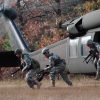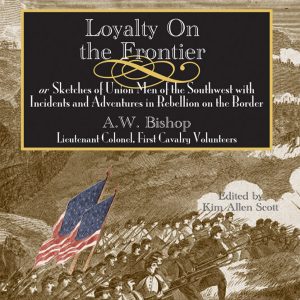calsfoundation@cals.org
Albert W. Bishop (1832–1901)
Albert W. Bishop served in Arkansas as an officer of the Union army during the Civil War and wrote two books detailing the experiences of Federal troops in the state. He later served as the second president of the Arkansas Industrial University, which later became the University of Arkansas (UA) in Fayetteville (Washington County).
Albert Webb Bishop was born in Alden, New York, on January 8, 1832, to Calvin Bishop and Emily Webb Bishop. He grew up in upstate New York. His father operated a grocery wholesale business, and the family eventually moved to Buffalo. Bishop attended Courtland Academy in Homer, New York, before attending Yale University in Connecticut and graduating in 1853 with a BA.
Studying law with his uncle, Bishop worked for a year as the principal of Courtland Academy before returning to the legal profession with a position in a Buffalo firm. He married Maria Woodward of Courtland in 1857. Joining the Republican Party the following year, Bishop became active with various political activities. Maria Bishop gave birth to a daughter, also named Maria, on January 3, 1860, but died a few days after giving birth, leaving Bishop to care for a newborn. Bishop then moved to La Crosse, Wisconsin, accompanied by his own mother to take care of infant Maria.
In La Crosse, Bishop worked as a lawyer and joined a militia artillery unit. At the outbreak of war, his mother and daughter went back to New York and he received a commission as a second lieutenant in the First Independent Battery, Wisconsin Light Artillery. He soon resigned that position and joined the Second Wisconsin Cavalry as a captain commanding Company B of the regiment, enlisting on October 25, 1861; his commission was dated to December 27 of the same year. The regiment arrived in St. Louis in March 1862, and two battalions of the unit moved to Arkansas, with the third battalion remaining in Missouri. Bishop moved with the units to Arkansas, where they joined the Union’s Army of the Southwest under the command of Major General Samuel Ryan Curtis at Batesville (Independence County).
Captain Marcus LaRue Harrison of the Thirty-Sixth Illinois Infantry worked with Unionist refugees from Arkansas while posted in southern Missouri. Realizing that these men were an untapped resource, he proposed the creation of a military unit composed of Arkansans, organized as the First Arkansas Cavalry (US); officers from other units transferred to the new unit, often in an effort to advance their own careers. Bishop joined the regiment as the lieutenant colonel or executive officer, second in command to Harrison, who obtained a commission as the colonel of the unit.
On November 10, 1862, Bishop received orders to proceed to the Elkhorn Tavern in Benton County to take command of two battalions of the regiment. Part of the regiment saw action at the Battle of Prairie Grove, but Bishop was not present. In early January 1863, he became the provost marshal at Fayetteville, tasked with keeping law and order in the town. Bishop and elements from his regiment participated in the Action at Fayetteville on April 18, 1863.
Abandoning the city to the Confederates, the Federals retreated to Missouri, and Bishop soon received an appointment as inspector of cavalry for the District of Southwest Missouri, with headquarters in St. Louis. While in that city, he completed the manuscript for his first book, Loyalty on the Frontier, or Sketches of Union Men of the Southwest with Incidents and Adventures in Rebellion on the Border. In January 1864, Bishop returned to the Fayetteville area and active service with his regiment. An old injury prevented him from riding a horse, and he received an appointment as the commander of the garrison at Fort Smith (Sebastian County) in March. He suffered from diarrhea and was forced to leave that post in June and travel to Little Rock (Pulaski County) for treatment.
In Little Rock, Bishop met with Governor Isaac Murphy, who offered the soldier the post of adjutant general of Arkansas. Murphy and Bishop knew one another from earlier in the war, and Murphy needed an experienced military officer with the appropriate connections for the post. In this role, Bishop commanded the state militia and helped organize military farm colonies in both the Delta and northwestern Arkansas to allow Unionist families and freedmen an opportunity to work the land. Bishop also wrote a work detailing the role of Arkansas Unionists in the war, titled Report of the Adjutant General of Arkansas, for the Period of the Late Rebellion, and to November 1, 1866.
At the end of the war, Bishop remained in his post until July 1, 1867, when he resigned after the Reconstruction Act of 1867 placed Federal troops in the state, negating his activities as adjutant general. He worked as a lawyer and married Kate Compton, the daughter of a former Confederate officer, in 1871.
With the establishment of the Arkansas Industrial University in 1871, Bishop was appointed treasurer of the new institution. The board appointed him as the second president in 1873, and he served until June 17, 1875. During his tenure, Old Main opened, and Bishop spent much of his time in Little Rock and elsewhere in the state drumming up support for the university. After the election of a Democratic legislature in 1874 and a reduction in his salary, Bishop resigned from the presidency.
Returning to Little Rock and the practice of law, he ran as the Republican candidate in the gubernatorial election of 1876, losing to William Read Miller. Unable to make a living in Little Rock, he returned to Buffalo in 1879. It is unclear if his wife went with him to New York, but the couple divorced in Pulaski County in 1886. In Buffalo, Bishop practiced law and lived for a period with his daughter. Retiring in 1891, he received a veteran’s pension. He died on November 29, 1901, and is reportedly buried in Buffalo.
For additional information:
Bishop, Albert. Report of the Adjutant General of Arkansas, for the Period of the Late Rebellion, and to November 1, 1866. Washington DC: Government Printing Office, 1867.
Bishop, Albert W. Loyalty on the Frontier, or Sketches of Union Men of the Southwest with Incidents and Adventures in Rebellion on the Border. Fayetteville: University of Arkansas Press, 2003.
Leflar, Robert Allen. The First 100 Years: Centennial History of the University of Arkansas. Fayetteville: University of Arkansas Press, 1972.
Reynolds, John Hugh, and David Yancey Thomas. History of the University of Arkansas. Fayetteville: University of Arkansas, 1910.
Scott, Kim Allen. “The Civil War in a Bottle: Battle at Fayetteville, Arkansas.” Arkansas Historical Quarterly 54 (Autumn 1995): 239–268.
David Sesser
Southeastern Louisiana University









Comments
No comments on this entry yet.